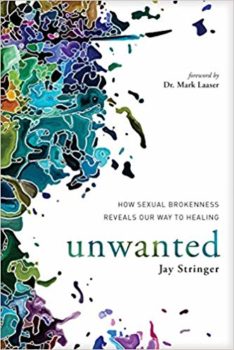Sexual Brokenness and Healing, Part One

This week, Dan kicks off a three-part conversation with Jay Stringer, a licensed mental health counselor, ordained minister, and author of the new book Unwanted: How Sexual Brokenness Reveals Our Way to Healing. Jay graduated from The Seattle School with a Master of Divinity and an MA in Counseling Psychology in 2009. He joins Dan to talk about Unwanted and the need to change the conversation about engaging sexual brokenness.
Dan: “I want to be very clear: this is a stunningly remarkable book.”

When Dan asks about the questions that prompted the book, Jay shares how, as a therapist, he was continually meeting people who had no notion of freedom from “unwanted sexual behavior” like pornography, infidelity, or buying sex. The purity movement had left many people feeling like deep change wasn’t possible—the emphasis on accountability felt more like managing symptoms than addressing issues of the heart. Similarly, a movement toward a “sex positive” worldview has also left many people unfulfilled, still struggling to enact the change they desired. Jay observes that the two extremes—either suppressing sexual desire or releasing it without meaning—left people in similar positions of frustration and hopelessness.
Jay: “Almost every paradigm people had been given was not effective for long-term change. […] Unless we change the conversation, we’re going to continue to consign men and women to a lifetime of futility with this issue. And I really don’t think it needs to be that way.”
We cannot transform something in our churches, much less in our own life, when we have no language to name that it exists.
Dan stresses that, rather than attempting to find some arbitrary middle ground between different perspectives, Jay is fundamentally changing the conversation. While other schools of thought try to minimize sexual struggle—either by silencing desire and avoiding the conversation, or by ignoring the word “struggle” and turning a blind eye to behaviors that cause harm—Jay offers this refrain: “Listen to your lust.” He invites us to stare into our struggles with deep curiosity, asking what we might learn by engaging the stories beneath the behaviors.
Jay: “What if we just asked people who were struggling with unwanted sexual behavior to tell us their story?”
Dan: “It’s so simple, it’s genius. It’s so elegant.”
To that end, Jay developed a research instrument of about 100 questions for nearly 4,000 men and women. The questions explored family of origin dynamics and early childhood events; present-day behaviors, struggles, and desires; and arousal templates—particular images, thoughts, sensations that are associated with an individual’s arousal. While the data offered new info and insights, it also offered explicit evidence for what Jay had come to know implicitly as a therapist and through his work with The Allender Center.
Jay: “What the data showed is that our unwanted sexual behavior is not random. It is a direct reflection of the parts of our story that remain unaddressed. So the implication is, if you want to find freedom, that freedom begins by identifying the unique reasons that bring you to it in the first place.”
Dan and Jay continue unpacking the research findings—including the impact of childhood sexual abuse on adult behavior, and the stunning connections between shame and unwanted behaviors. They also discuss the enduring influence of our earliest family relationships: the seeds of anger that grow out of rigid family systems, and the seeds of lust that thrive in a disengaged family. Dan highlights how rare it is to hear anger mentioned in these conversations, which often focus exclusively on lust, and Jay emphasizes how crucial anger is—particularly male anger—to the dynamics unfolding in our society.
Jay: “We have to look, culturally, at what’s unfolding. So much of what we see is there is an abuse of power, and there is an anger and an entitlement within male sexuality. […] There is a misuse of power playing out within male sexuality that needs to be confronted.”
We believe that this is a vital conversation with huge implications. Join us next week when we share Part Two of this series.
